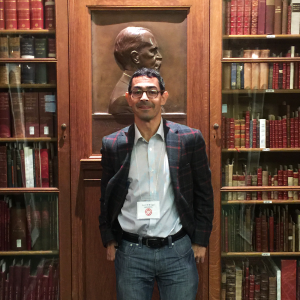Takeaway
Because of the pandemic, some patients have avoided healthcare settings and professionals. Outreach to these patients is needed.

Passion in the Medical Profession | February 14, 2022 | 2 min read
By Scott Wright, MD, Johns Hopkins Medicine
Doing things repeatedly provides a unique perspective. I just spent two weeks on the inpatient medical units for the 27th consecutive year at the same hospital. Some things have changed dramatically over this time—the electronic medical record, the speed with which many test results become available, the quality of the imaging, the number of medications at our disposal for treatment, and I’ve gained an understanding about how to be an effective attending.
Other things have changed very little. Patients who are admitted to the hospital are still fearful and grateful for the care. There’s still so much to be learned from every patient. Every day is still different and full of surprises. And it continues to be extremely rewarding to work with a multidisciplinary team to serve patients.
Over the last two weeks, it struck me that the non-COVID patients being admitted from the emergency room were markedly sicker and more medically fragile than I ever remember them being. Significantly worse than last year or the year before. Their heart failure, COPD, inflammatory bowel disease, and other chronic medical illnesses were incredibly advanced and flaring angrily. Also, many patients who were admitted with weakness, failure to thrive, or altered mental status had widely metastatic cancer. After our team initiated goals of care conversations with all of them, more than half needed consultation with palliative care to coordinate comfort care and hospice.
In getting to know our patients, we learned that the patients had had far fewer interactions with family members in the last couple of years (during the pandemic). Further, many had avoided healthcare and hadn’t seen their primary care physicians and specialists in much too long. For many, this translated into their discontinuation of critically important medications.
It was sad to see this reality. Working primarily in the outpatient arena, I was mistakenly convinced that, beyond the mortality associated with infection with COVID, the pandemic had a negligible impact on our patients and the communities we serve. During my time on the wards, I saw that I had fooled myself. While many patients have remained plugged in via telemedicine and/or in-person visits, countless others haven’t been receiving adequate care or have been lost to follow-up.
These last two weeks on the medicine wards have clearly shown me that impact of the COVID-19 pandemic (with its >925K deaths in this country alone) is being dramatically underestimated. I’ve made a list of my patients that I feel like I haven’t seen in a long time and my ambulatory team is reaching out to them to try to bring them in. I invite you to consider doing the same.
Finally, I’m truly inspired by the steadfast commitment and tireless efforts of the entire healthcare team. I could not be more proud or appreciative of the amazing people who are working in healthcare.
This piece expresses the views solely of the author. It does not necessarily represent the views of any organization, including Johns Hopkins Medicine.

